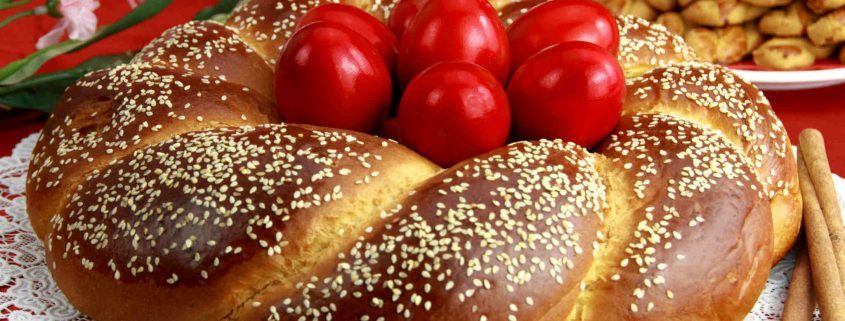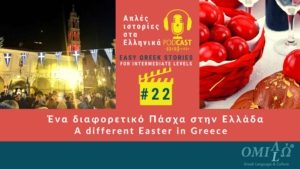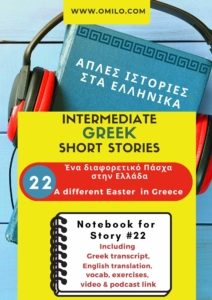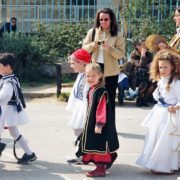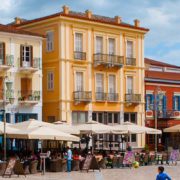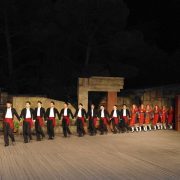How Do Greeks Celebrate Easter? And what are the Greek Easter Traditions?
Greek Orthodox Easter is probably the biggest celebration of the year for most Greeks, with a lot of special traditions and family gatherings.
It is also one of the reasons Omilo organizes every year a Greek Easter course.
For 26 years in a row, the Omilo-team is celebrating Easter together with students (except of the „covid years in 2020 and 2021“).
If you can not be in Greece during Easter time, but you are curious, then read below what Greek Easter is about, and/or watch some videos!
40 days before Easter – fasting period
The preparations for the Greek Easter actually start from “Kathara Devtera” (Clean Monday) onward.
All Greeks celebrate the national holiday “Kathara Devtera”, which is the last day of carnival and the first day of the so-called “fasting period”.
Click here and take a look at the video, to get an idea of the typical foods for celebrating Kathara Devtera.
From that day onward till Easter people might greet you with “kali sarrakosti” (We wish you a nice 40 days!),
since there are 40 days till the “holy week” (the week before Easter Sunday).
From Clean Monday till Easter Sunday children could count the 7 weeks with a traditional “Kuria Sarrakosti calendar”!
(Kathara Devtera is the first day of the so-called “fasting period” and the last day of Carnival.)
Greek Orthodox Lent is a time of fasting, which means abstaining from foods that contain animals with red blood (meats, poultry, game)
and products from animals with red blood (milk, cheese, eggs, etc.) and fish and seafood with backbones.
(The purpose of fasting is to cleanse the body as well as the spirit in preparation for accepting the Resurrection at Easter,
which is the most sacred of all observances in the Greek Orthodox faith.)
The theory is one thing, but in practice most Greeks do not bother so much about “fasting” the entire 40 days,
However, most Greeks do fast one week before Easter, during the so-called “holy week” „megali evdomada“ !
Nevertheless, for those that want to fast, and can do without eggs, milk, meat, etc… for 40 days, in every shop you will find “nistissima”,
the foods you can eat during the “fasting period”.
The „Holy Week“ (η Μεγάλη Εβδομάδα)
The week before Easter Sunday, the Holy Week, begins on Palm Sunday.
Greek Easter is a very special and holy time indeed! Even for non-religious Greeks or foreigners,
the atmosphere is nice and it is a part of the Greek culture and traditions.
There are church services everyday commemorating the last week in the life of Jesus Christ.
The evening services are the most attended, except for Wednesday when the Service of the Holy Unction is held in the afternoon.
On Thursday morning the service commemorates the Last Supper and the Betrayal of Christ.
This is the day that the hard-boiled eggs are dyed red, signifying the blood of Christ, and the Easter bread, called tsoureki, is baked.
The evening service on Thursday is a long one and features twelve gospel readings.
Meanwhile, people are shopping for their Easter gifts and buying their lambs of all sizes for Easter Sunday.
Athenians who have family-connections to the islands and villages on the mainland are preparing to leave the city, as well as people with no family ties!
Good Friday (η Μεγάλη Παρασκευή)
On Good Friday, the figure of Christ is taken down from the cross. The epitaphios , decorated with flowers by the girls through the night, is brought into the church.
The bells of the church can be heard all over and all the flags in Greece are lowered to half-mast.
In the evening a “funeral service” is held and at about 9pm the epitaphios is taken from the church and carried through the streets in a procession.
Now everybody follows the epithaphios while carrying “beige” candles.
On Good Friday the candlelit funeral procession takes place in every church around 20.00-21.00 h.
The procession takes place all over the town, while (some) people also sing…
Take a look at the Easter procession video here
After the procession, the different „epitaphia“ from various churches, are coming together on the main square of the town or village
Note; In Nafplion there is also music during the procession, since it a very popular destination for Athenians to celebrate Easter,
but in other places you will see the same procession without music and less people.
Click here to watch a video of the Good Friday Procession and Epitaphio in Maroussi, North Athens
During the whole week till Saturday evening you can greet each other with the usual “Xronia Polla”,
but also with “Kalo Pasxa” (Happy Easter) or otherwise “Kali Anastasi”.
Easter Saturday (το Μεγάλο Σάββατο)
On Easter Saturday the Orthodox Patriarch breaks the seal of the door of the tomb of Christ in the Church of the Holy Sepulcher in Jerusalem
and emerges with the Holy Fire, which is then flown by Aegean or Olympic Airways, accompanied by high-ranking priests
and government officials to Athens airport where it is met by an honor guard to the small church of Agia Anargyroi in Plaka (center Athens).
From there the light is distributed to churches all over Attika and the rest of Greece.
At 11pm on Saturday night pretty much the entire country is in church. The lights are turned off at midnight and the priest announces
that Christ has arisen from the dead as candles (this day only white candles!) are lit.
The tiny glow at the front of the church grows and soon the whole room is illuminated by the light of everyone’s candles.
Exactly at midnight the priest sings the Paschal hymn:
“Christ has risen from the dead and in so doing has trampled on death and to those in the tombs he has given life”.
The church bells ring in celebration, fireworks go off, ships sound their sirens and the light and sound makes any European New Year celebration seem tame in comparison!
People greet each other happily with the words Christos Anesti (Christ has risen) which is replied to with Alithos Anesti (Truly He has arisen).
Greeks will light their candle at midnight and quickly try to walk home or to the tavern without
a) the candle going out
b) wax dripping on clothes, and
c) someone else’s candle setting clothes (or hair) on fire!
Gunshots, dynamite and fireworks will be going on for the next 3 hours or more, with every year blowing off a finger or two! Just be careful!
From Saturday midnight you greet people with “Christos Anesti” (= Christ resurrected)
and you are supposed to answer with “Alithos Anesti” (= Yes, he truly resurrected)
On Saturday night , normally after midnight, Greeks eat the famous “mayeritsa” soup,
a thick green soup made from the intestines of the lamb that will be roasted the next day, breaking their 40 day fast.
The same evening, you can start cracking red eggs.
Take a look at this video, where Omilo students crack the red eggs.
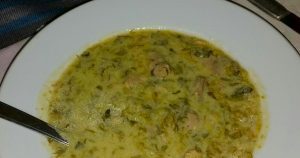

Easter Sunday – Καλό Πάσχα!
Easter day, Sunday, is most people’s favorite day of the year.
A lamb is roasted (or baked in the oven) and friends and families get together to eat, drink, talk and dance.
So Greek Easter Sunday means eating Greek lamb, goat, kokoretsi, wine, tsoureki bread and cracking red eggs, …
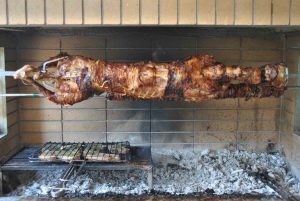
If you are a vegetarian or vegan, you might not like Greek Easter, but do not worry, Greek cuisine has a lot of vegetable dishes as well.
Easter is not only about eating…but also about dancing, enjoying the beautiful nature and wildflowers everywhere.
Omilo students enjoy the atmosphere of the Easter days, as well as the meals. And of coure, we also dance!
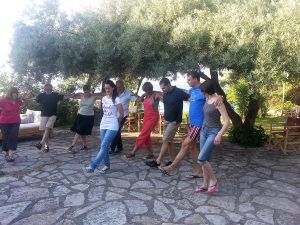
Greek Easter Vocabulary
η εθνική γιορτή : the national holiday
η Μεγάλη Εβδομάδα : the holy week
η Μεγάλη Παρασκευή : Good Friday
το Μεγάλο Σάββατο : Easter Saturday
κρέας : meat
λαχανικά : vegetables
νηστεύω : The verb “to fast”
τα νηστίσιμα (φαγητά) : Food you are allowed to eat in case you are fasting
ο παππάς : the priest
το αρνί : lamb
το κατσίκι : goat
το κοκορέτσι : a grilled dish made basically from the intestines of lamb/goat
ο χορτοφάγος: vegetarian
How you can greet each other from “Kathara Devtera” till Greek Easter
Kαλή Σαρακοστή : (we wish you a nice 40 days)
χρόνια πολλά : means “Many years”. You can use this also for birthdays, name days, Christmas, etc…
Καλό Πάσχα : Happy Easter
Καλή Ανάσταση : “Have a nice resurrection”
Χριστός Ανέστη : “Christ resurrected” (you can only say this from Easter Saturday midnight till some weeks after that)
Αληθώς Ανέστη: “Yes, Christ truly resurrected” (you can only use this as an answer to “Christos Anesti”)
Would you also like to experience Greek Easter in Greece, while learning Greek? Then you are very welcome at Omilo.
The course dates are usually announced in November, so about 5 months before Easter.
You can find the course overview at https://omilo.com/greek-language-courses/year-overview/
Not in the mood to learn Greek during Easter, but ready to visit Nafplion yourself, and looking for accommodation?
There are many options available, for every taste and budget.
Take a quick look at
https://omilo.com/accommodation-in-nafplion/
+++++++++++++++++++++++++++++++++++++++++++
Interesting places where you can celebrate Greek Easter
The Omilo-team usually celebrates Easter in Nafplion, but of course, you can celebrate Easter all over Greece.
From region to region, Greek traditions can be a bit different
but
A. Everywhere in Greece, you can find the typical Easter traditions, as mentioned before, such as:
Red eggs: Greeks dye red eggs on the Thursday before Easter and they “crack” them after the Resurrection on Easter Saturday.
The person who successfully cracks the eggs of the other person is declared the winner and, it is said, will have good luck during the year.
The person who starts to crack the egg says: “ Christos Anesti (=Christ has risen)” and the other replies with “ Alithos Anesti” (=Truly, He has arisen).
Epitaphios: Greeks decorate the Epitaphios in the morning of Good Friday in the church and in the evening it is carried through the village or the city.
During the procession of the Epitaphios, people sing hymns and carry candles.
Mageiritsa: after the Resurrection on Easter Saturday, it‘s time for dinner. A green soup made of lamb intestines, called mageiritsa, is waiting for you.
Do not worry, it’s tastier than it sounds or looks like!
Easter lamb: on Easter Sunday, Greeks mostly eat lamb (or goat). Early in the morning, you can smell everywhere the roasted meat and from about 1 pm you gather with family, friends for the Easter lunch. On the menu, you will always find lamb or goat, together with salads and the necessary “mezedes” (appetizers).
B. 4 Amazing places to spend a special Greek Easter
Apart from those widely known customs, some places also have something extra to offer:
Corfu and Lefkada (Ionian Islands)
On the islands of Corfu and Lefkada, the philharmonic orchestra accompanies some beautiful customs. On Easter Saturday, the orchestra plays happy rhythms, while the housewives get rid of all pottery, throwing it from their windows. The church bells ring and thousands of pots are being thrown on the roads making a lot of noise.
For more info about Easter on Corfu island, click here
Chios Island
The night sky gets lit up with thousands of flashes/ rocket-war. A good reason for somebody to be in Chios during Easter is the rocket-war. A custom that lasts since the Turkish occupation and the local people love it a lot. The handmade rockets and the fireworks offer an impressive spectacle! In Vrontados there are 2 churches, Agios Marcos and Erithiani. In a very folkloristic manner, rockets are being fired at those churches by the two competing communities of the village. The preparation of the rockets begins after Easter, so as to be ready next year!
Hydra island
Hydra is about 2 hours by boat from Piraeus (Athens) and known for the picturesque island without cars or motorbikes, but many donkeys! From a very peaceful island in winter, it becomes a very cosmopolitan one during the Easter celebrations. In the evening of Good Friday, they do not only have the beautiful procession of the Epitaphios through the narrow streets, but also the „Sea Epitaph” of the parish of Agios Ioannis. After the procession arrives at the small port of Kaminia, the Epitaph is submerged in the sea to bless the waters and prayer is sung for the sponge divers and the sailors of the island. After the procession of the Epitaph, people gather to enjoy fresh seafood in the local taverns.
Syros island (Cyclades)
Syros island is the only island in Greece and one of the few places in the world where they celebrate Catholic Easter and Orthodox Easter at the same time.
Usually, Catholic Easter is celebrated one or more weeks before the Greek Orthodox Church. However, in Syros both churches celebrate on whatever day the Orthodox calendar celebrates. Every Easter the locals keep all their customs and traditions, while the Catholic and Orthodox Church holds Epitaph processions in Ermoupolis. It is a tradition that has sealed the harmonious synchronicity of the two Churches and the Orthodox and Catholic Population. Something the island can be really proud of, and an example for the world…
++++++++++++++++++++++++
In the mood to also listen to a story related to Greek Easter?
Then listen to the Podcast story, in Greek, with audio, or video.
Also the Notebook is available, with English translations, exercises, and a lot of extra information about Greek Easter

